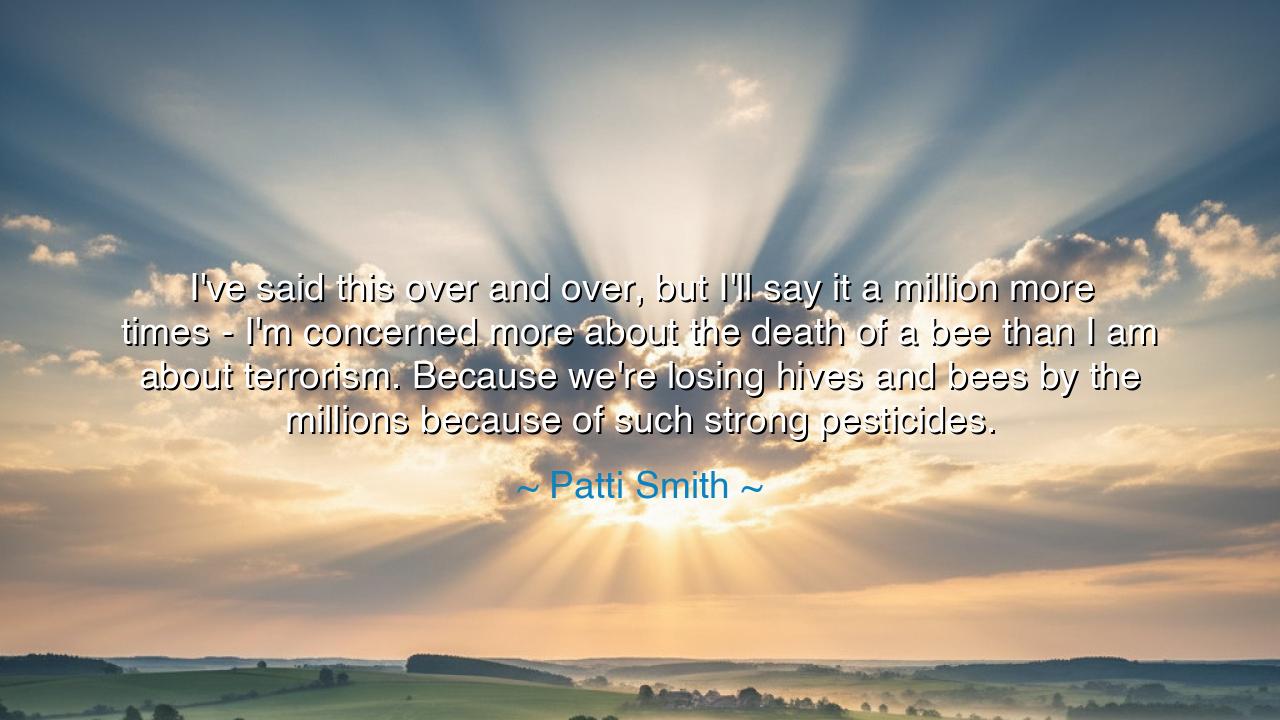
I've said this over and over, but I'll say it a million more
I've said this over and over, but I'll say it a million more times - I'm concerned more about the death of a bee than I am about terrorism. Because we're losing hives and bees by the millions because of such strong pesticides.






“I've said this over and over, but I'll say it a million more times — I'm concerned more about the death of a bee than I am about terrorism. Because we're losing hives and bees by the millions because of such strong pesticides.” Thus spoke Patti Smith, the poet and prophet of rock and roll, whose voice has always been tuned to the quiet frequencies of truth. In these words, she lifts her gaze above the noise of fear and politics to remind us of a deeper peril—the death of the small, the sacred, the living threads that hold the tapestry of the Earth together. For the bee, in her humble flight, carries the weight of creation itself, and her loss marks not the fall of a single species, but the unraveling of balance, the dimming of life’s great symphony.
The origin of this quote rests in Patti Smith’s lifelong reverence for nature and her awareness of humanity’s fragile bond with it. Having lived through the tumults of modern history—war, revolution, and art’s ceaseless transformation—she saw how human attention is too often drawn to the loud and the violent, while the true catastrophes unfold quietly beneath our notice. In the death of the bees, Smith discerned a sign of civilization’s blindness: a species so concerned with power and terror that it fails to mourn the silent collapse of its own sustenance. Pesticides, she warns, are not only poisons of the soil, but of the spirit—they reveal our estrangement from the living world that once nourished us.
To say that she fears the death of a bee more than terrorism is to declare that the greater threat to humanity lies not in enemies with weapons, but in humanity’s own forgetfulness. Terrorism destroys cities; ecological ignorance destroys worlds. When a hive dies, it is not only the honey that is lost, but the pollination of the flowers, the feeding of the fruit, the breathing of the forests. The bee is a symbol of interdependence, the living emblem of how all things are bound together. Her death is the whisper before the storm, the omen that the web of life begins to tear.
History offers countless echoes of this truth. In ancient Egypt, bees were sacred messengers of the gods, symbols of the soul’s immortality. Pharaohs carved their image upon tombs as emblems of divine order. But when the Nile’s floods grew poisoned and the crops failed, even kings learned that no temple can stand without the hum of the hive. Centuries later, in our own time, the decline of the bees mirrors the same lesson: that the smallest lives sustain the greatest civilizations. Nature, patient and watchful, exacts her justice not through wrath, but through silence—by withdrawing the very foundations of abundance.
Patti Smith’s lament is thus not one of despair, but of awakening. She calls us to care again for what seems insignificant, to recognize that beauty and survival begin with the smallest acts of harmony. The bee teaches humility: that our dominion over the Earth is an illusion, and that the fate of the world rests not in the towers we build, but in the fields we neglect. To love the bee is to remember the covenant of stewardship—to know that every creature, however small, carries within it the pulse of the divine.
Her words also rebuke the culture of fear that grips our age. While the world obsesses over visible threats, it ignores the invisible death spreading through its soil and air. The wars of men will one day end; the war against nature, if it continues, will leave no victors. In this light, her quote becomes a moral mirror: what do we value more—the noise of politics or the quiet hum of life? Do we measure safety by the absence of enemies, or by the presence of thriving fields and living forests?
The lesson, then, is profound: awaken to the small, and you will save the great. Protect the bees, and you protect the chain of life itself. Seek not only peace among nations, but peace with the earth beneath your feet. Each flower planted, each pesticide refused, each moment of reverence for the natural world is an act of rebellion against the blindness of an age. For as the ancients knew, and as Patti Smith reminds us, the spirit of the world does not roar—it hums. And when that hum is silenced, so too is the song of humanity.
So, O listener, remember this: to guard the bee is to guard the breath of the Earth. Fear not the hand that wields a weapon, but the one that forgets the garden. Tend to the living world with care, and you will find not only survival, but sanctity—for in the buzzing of wings and the bloom of flowers lies the promise of our own renewal.






AAdministratorAdministrator
Welcome, honored guests. Please leave a comment, we will respond soon